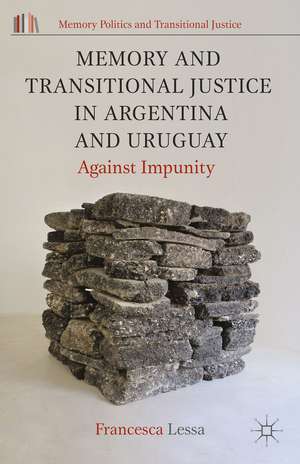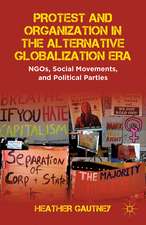Memory and Transitional Justice in Argentina and Uruguay: Against Impunity: Memory Politics and Transitional Justice
Autor Francesca Lessaen Limba Engleză Paperback – 9 dec 2014
| Toate formatele și edițiile | Preț | Express |
|---|---|---|
| Paperback (2) | 386.99 lei 6-8 săpt. | |
| Palgrave Macmillan US – 9 dec 2014 | 386.99 lei 6-8 săpt. | |
| Palgrave Macmillan US – 11 apr 2013 | 386.99 lei 6-8 săpt. | |
| Hardback (1) | 391.61 lei 6-8 săpt. | |
| Palgrave Macmillan US – 11 apr 2013 | 391.61 lei 6-8 săpt. |
Din seria Memory Politics and Transitional Justice
- 15%
 Preț: 579.52 lei
Preț: 579.52 lei - 20%
 Preț: 691.18 lei
Preț: 691.18 lei - 15%
 Preț: 588.50 lei
Preț: 588.50 lei -
 Preț: 387.75 lei
Preț: 387.75 lei -
 Preț: 384.86 lei
Preț: 384.86 lei -
 Preț: 383.71 lei
Preț: 383.71 lei - 18%
 Preț: 789.98 lei
Preț: 789.98 lei - 15%
 Preț: 693.90 lei
Preț: 693.90 lei - 15%
 Preț: 698.80 lei
Preț: 698.80 lei - 18%
 Preț: 727.00 lei
Preț: 727.00 lei - 18%
 Preț: 779.26 lei
Preț: 779.26 lei - 18%
 Preț: 889.43 lei
Preț: 889.43 lei -
 Preț: 453.21 lei
Preț: 453.21 lei - 15%
 Preț: 691.91 lei
Preț: 691.91 lei -
 Preț: 416.71 lei
Preț: 416.71 lei - 18%
 Preț: 729.68 lei
Preț: 729.68 lei -
 Preț: 417.68 lei
Preț: 417.68 lei -
 Preț: 447.99 lei
Preț: 447.99 lei -
 Preț: 484.47 lei
Preț: 484.47 lei - 18%
 Preț: 782.72 lei
Preț: 782.72 lei
Preț: 386.99 lei
Nou
Puncte Express: 580
Preț estimativ în valută:
74.06€ • 77.12$ • 62.59£
74.06€ • 77.12$ • 62.59£
Carte tipărită la comandă
Livrare economică 10-24 martie
Preluare comenzi: 021 569.72.76
Specificații
ISBN-13: 9781137485007
ISBN-10: 1137485000
Pagini: 319
Ilustrații: XVI, 319 p. 12 illus.
Dimensiuni: 140 x 216 x 18 mm
Greutate: 0.39 kg
Ediția:2013
Editura: Palgrave Macmillan US
Colecția Palgrave Macmillan
Seria Memory Politics and Transitional Justice
Locul publicării:New York, United States
ISBN-10: 1137485000
Pagini: 319
Ilustrații: XVI, 319 p. 12 illus.
Dimensiuni: 140 x 216 x 18 mm
Greutate: 0.39 kg
Ediția:2013
Editura: Palgrave Macmillan US
Colecția Palgrave Macmillan
Seria Memory Politics and Transitional Justice
Locul publicării:New York, United States
Cuprins
Introduction 1. Theoretical Framework: Critical Junctures, Transitional Justice, and Memory Narratives 2. The Downward Spiral toward Dictatorship 3. Transitional Justice in Argentina (1983–2012): A Global Protagonist with Its Ups and Downs 4. Reconciliation versus Justice: Entwining Memory and Transitional Justice in Argentina 5. Transitional Justice in Uruguay (1985–2012): Latecomer or Unique? 6. Pacification or Impunity? The Ley de Caducidad and the Interweaving of Memory and Transitional Justice in Uruguay Conclusion
Recenzii
“Lessa provides a valuable contribution to thetransitional justice literature by insisting on the importance of memorynarratives in historical processes. She presents a useful starting point forfuture analysis of other transitional justice cases, in the southern cone andbeyond. The book will be of considerable use to transitional justice scholars,human rights practitioners and others interested in the dynamics between memoryand policy in post conflict and transitioned regimes.” (Jessica Mecellem,Democratization, Vol. 23 (2), July, 2015)
'Francesca Lessa's book makes a novel contribution to transitional justice. Lessa blends nuanced analysis of political memory of the authoritarian past with an in-depth study of decisions regarding the full range of institutional mechanisms (i.e., truth commissions, trials, amnesty, reparations) used to deal with that past. Her work emphasizes the critical junctures that shape and shift memory narratives and transitional justice mechanisms. Lessa thus examines a dynamic and evolving process in Argentina and Uruguay, introducing a new methodological approach to dealing with past state violence. Her rich qualitative research in the two countries is informative, profound, and compelling to read." - Leigh A. Payne, University of Oxford, UK
'In this timely and interdisciplinary new book, Francesca Lessa provides not only an account of how Argentina and Uruguay have dealt with their traumatic pasts but also a window on how social actors make meanings of the transitional justice process. Integrating secondary sources, documents, and interviews, as well as field notes, this book will be of interest to a wide readership, including students of Latin American studies, international relations, memory studies, and international law' - Mariana Achugar, Carnegie Mellon University, USA
'Forty years ago gross and systematic human rights violations were committed in Argentina and Uruguay. Francesca Lessa offers a thorough and in-depth analysis of the struggles that have been waged in both countries since the end of the military dictatorships to deal with and make sense of these experiences of extreme violence. Her work sheds light on the complex political, legal, and ethical issues involved and provides insight into the changing relations between democracy, justice, and memory on both sides of the Río de la Plata.' - Emilio Crenzel, Universidad de Buenos Aires, Argentina
'Francesca Lessa's book makes a novel contribution to transitional justice. Lessa blends nuanced analysis of political memory of the authoritarian past with an in-depth study of decisions regarding the full range of institutional mechanisms (i.e., truth commissions, trials, amnesty, reparations) used to deal with that past. Her work emphasizes the critical junctures that shape and shift memory narratives and transitional justice mechanisms. Lessa thus examines a dynamic and evolving process in Argentina and Uruguay, introducing a new methodological approach to dealing with past state violence. Her rich qualitative research in the two countries is informative, profound, and compelling to read." - Leigh A. Payne, University of Oxford, UK
'In this timely and interdisciplinary new book, Francesca Lessa provides not only an account of how Argentina and Uruguay have dealt with their traumatic pasts but also a window on how social actors make meanings of the transitional justice process. Integrating secondary sources, documents, and interviews, as well as field notes, this book will be of interest to a wide readership, including students of Latin American studies, international relations, memory studies, and international law' - Mariana Achugar, Carnegie Mellon University, USA
'Forty years ago gross and systematic human rights violations were committed in Argentina and Uruguay. Francesca Lessa offers a thorough and in-depth analysis of the struggles that have been waged in both countries since the end of the military dictatorships to deal with and make sense of these experiences of extreme violence. Her work sheds light on the complex political, legal, and ethical issues involved and provides insight into the changing relations between democracy, justice, and memory on both sides of the Río de la Plata.' - Emilio Crenzel, Universidad de Buenos Aires, Argentina
Notă biografică
Francesca Lessa is a junior research fellow at the University of Oxford.

















